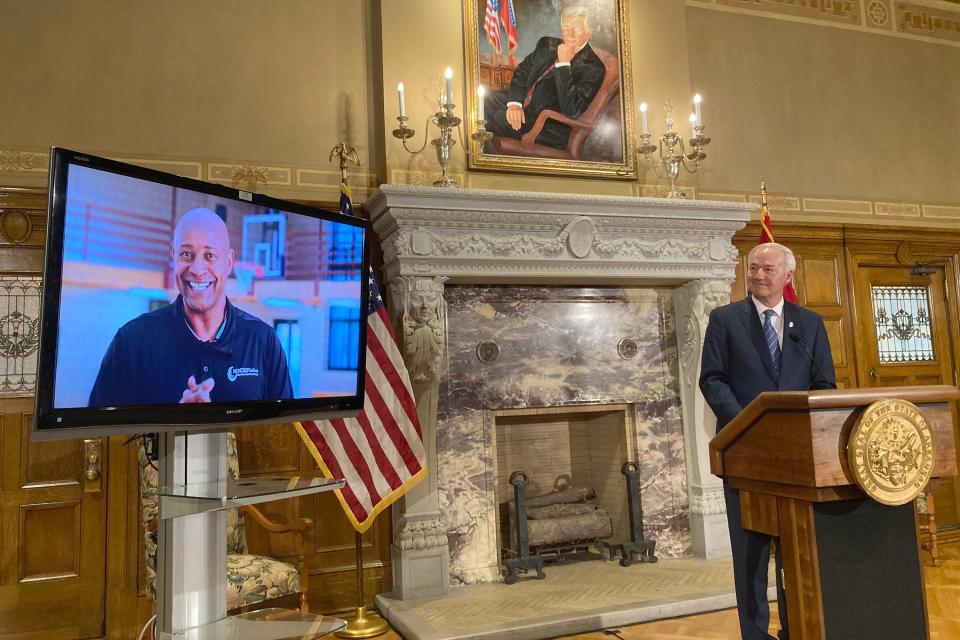The Delta variant is hitting red states hardest as the US's vaccine divide widens
The Delta variant is sickening people most in unvaccinated, heavily Republican states.
Arkansas, Mississippi, Missouri, and Wyoming have seen upticks in cases and hospitalizations.
But the variant has had little effect in blue states such as Maine, New Hampshire, and Vermont.
The US's daily coronavirus cases have soared 60% in the past two weeks as the Delta variant strengthens its hold on the country. Delta now accounts for more than half of US cases, making it the dominant strain nationwide.
But the variant isn't hitting all states equally. Delta cases have risen primarily in states with low vaccination rates, which for the most part are heavily Republican - "red" states such as Arkansas, Mississippi, Missouri, and Wyoming. Overall, these states have seen higher upticks in daily cases and hospitalizations than "blue" states that voted Democratic in the 2020 election.
In Missouri, for instance, daily cases have risen around 75% in the past two weeks, from around 800 to 1,400 cases per day. Hospitalizations have also risen 34% during that time, from around 830 to 1,100 per day. Delta has made up almost 70% of all coronavirus cases there over the past two months, found data compiled by Scripps Research's Outbreak.info tracker. Less than half of Missouri residents (around 46%) have received at least one vaccine dose so far - well below the US average of 56%.
But Vermont, where almost 75% of residents have received at least one dose, has reported five daily cases and five daily hospitalizations in the past two weeks. Delta made up less than 1% of coronavirus cases there in the past two months.
Other blue states, such as Maine, New Hampshire, and Pennsylvania, have also reported some of the lowest case numbers and highest vaccination rates in the country. In each of these states, Delta has represented less than 10% of overall cases in the past two months, Outbreak.info showed.
"We've got to get away from the divisiveness," Anthony Fauci, the director of the National Institute of Allergy and Infectious Disease, told ABC on Sunday - a reference to the way the US's vaccine divide falls along political lines.
Viruses, Fauci added, "don't know the difference between a Democrat, a Republican, or an Independent."
Republicans are less likely than Democrats to trust vaccines

Data collected by The New York Times showed that 34% of people are fully vaccinated in an average US county that voted for Donald Trump, whereas 45% of people are fully vaccinated in an average county that voted for Joe Biden.
There are reasons the vaccination rates are stalling in red states. For one, Republicans are more likely to believe that vaccines aren't safe or that the shots aren't necessary to protect their health, indicated a June survey from the Kaiser Family Foundation.
Additionally, Republican states also tend to be more rural, so access to shots may still prevent some people in those areas from getting immunized.
In Arkansas, for instance, around 42% of counties are rural. Research from Boston Children's Hospital suggests that some Arkansas counties qualify as "vaccine deserts," with the nearest COVID-19 vaccination site more than a 15-minute drive away. Just 43% of Arkansas residents have received at least one vaccine dose.
But the state's health director, Dr. José Romero, blamed the low vaccination rate on widespread vaccine hesitancy - not lack of access. The Kaiser Family Foundation survey found that rural residents were also significantly more vaccine hesitant than urban or suburban residents.
"We've done everything we can," Romero told Insider. "We've made the vaccine available. We've gone the extra mile to make it pretty much on demand if you want it."

Delta has made up nearly 40% of Arkansas' cases over the past two months - among the highest shares in the country. Romero said he has tried to remind residents that the variant poses "a much greater threat" than the original coronavirus strain.
An analysis from Public Health England found that Delta was associated with a 60% increased risk of household transmission relative to the Alpha variant discovered in the UK, though more recent estimates suggested that the difference was closer to 40%. The Alpha variant is already about 50% more transmissible than the original strain, the Centers for Disease Control and Prevention said.
Researchers in Scotland also found that getting infected with the Delta variant doubled the risk of hospital admission relative to Alpha. (Previous studies have suggested that the Alpha variant may be 30% to 70% deadlier than the original strain.)
Vaccines, of course, significantly lower that risk, but it's important to complete the full course. New research suggested that partially vaccinated people are more vulnerable to symptomatic Delta infections than they might be to other strains. A study published last week in the journal Nature found that a single dose of Pfizer's vaccine was either weakly or not at all effective against the variant.
"It's very clear that this is a nasty variant," Fauci told ABC. "It has a much greater capability of transmitting from person to person."
Read the original article on Business Insider

